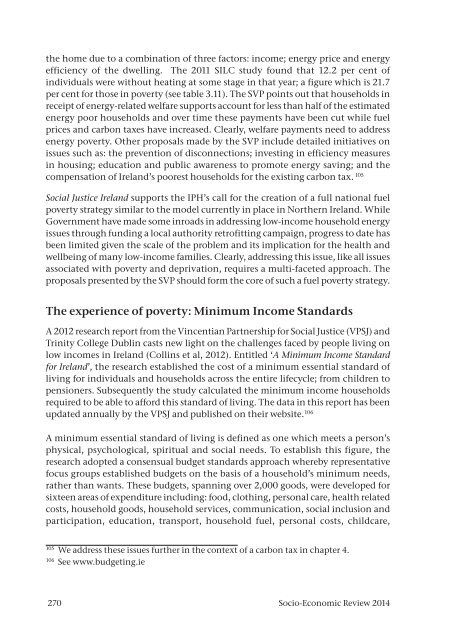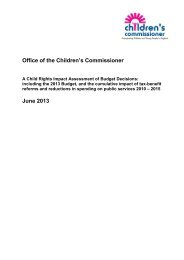2014-04-22 - Socio Economic Review 2014 - Full text and cover - FINAL
2014-04-22 - Socio Economic Review 2014 - Full text and cover - FINAL
2014-04-22 - Socio Economic Review 2014 - Full text and cover - FINAL
Create successful ePaper yourself
Turn your PDF publications into a flip-book with our unique Google optimized e-Paper software.
the home due to a combination of three factors: income; energy price <strong>and</strong> energy<br />
efficiency of the dwelling. The 2011 SILC study found that 12.2 per cent of<br />
individuals were without heating at some stage in that year; a figure which is 21.7<br />
per cent for those in poverty (see table 3.11). The SVP points out that households in<br />
receipt of energy-related welfare supports account for less than half of the estimated<br />
energy poor households <strong>and</strong> over time these payments have been cut while fuel<br />
prices <strong>and</strong> carbon taxes have increased. Clearly, welfare payments need to address<br />
energy poverty. Other proposals made by the SVP include detailed initiatives on<br />
issues such as: the prevention of disconnections; investing in efficiency measures<br />
in housing; education <strong>and</strong> public awareness to promote energy saving; <strong>and</strong> the<br />
compensation of Irel<strong>and</strong>’s poorest households for the existing carbon tax. 105<br />
Social Justice Irel<strong>and</strong> supports the IPH’s call for the creation of a full national fuel<br />
poverty strategy similar to the model currently in place in Northern Irel<strong>and</strong>. While<br />
Government have made some inroads in addressing low-income household energy<br />
issues through funding a local authority retrofitting campaign, progress to date has<br />
been limited given the scale of the problem <strong>and</strong> its implication for the health <strong>and</strong><br />
wellbeing of many low-income families. Clearly, addressing this issue, like all issues<br />
associated with poverty <strong>and</strong> deprivation, requires a multi-faceted approach. The<br />
proposals presented by the SVP should form the core of such a fuel poverty strategy.<br />
The experience of poverty: Minimum Income St<strong>and</strong>ards<br />
A 2012 research report from the Vincentian Partnership for Social Justice (VPSJ) <strong>and</strong><br />
Trinity College Dublin casts new light on the challenges faced by people living on<br />
low incomes in Irel<strong>and</strong> (Collins et al, 2012). Entitled ‘A Minimum Income St<strong>and</strong>ard<br />
for Irel<strong>and</strong>’, the research established the cost of a minimum essential st<strong>and</strong>ard of<br />
living for individuals <strong>and</strong> households across the entire lifecycle; from children to<br />
pensioners. Subsequently the study calculated the minimum income households<br />
required to be able to afford this st<strong>and</strong>ard of living. The data in this report has been<br />
updated annually by the VPSJ <strong>and</strong> published on their website. 106<br />
A minimum essential st<strong>and</strong>ard of living is defined as one which meets a person’s<br />
physical, psychological, spiritual <strong>and</strong> social needs. To establish this figure, the<br />
research adopted a consensual budget st<strong>and</strong>ards approach whereby representative<br />
focus groups established budgets on the basis of a household’s minimum needs,<br />
rather than wants. These budgets, spanning over 2,000 goods, were developed for<br />
sixteen areas of expenditure including: food, clothing, personal care, health related<br />
costs, household goods, household services, communication, social inclusion <strong>and</strong><br />
participation, education, transport, household fuel, personal costs, childcare,<br />
105<br />
We address these issues further in the con<strong>text</strong> of a carbon tax in chapter 4.<br />
106<br />
See www.budgeting.ie<br />
270 <strong>Socio</strong>-<strong>Economic</strong> <strong>Review</strong> <strong>2014</strong>



